Summer Squash
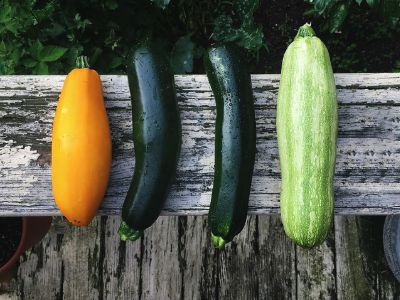
Preparation: Step-by-Step
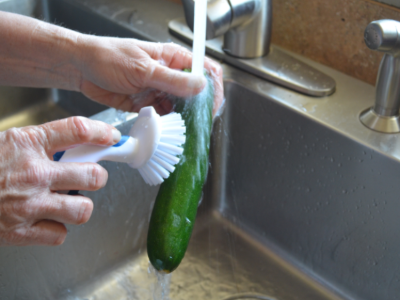
Wash hands. Thoroughly rinse squash to remove dirt.
Cut squash in half lengthwise.
Firmly hold squash on cung board.
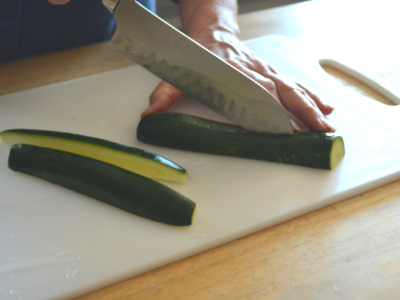
Place flat side of squash on cutting board to quarter.
Keep the length of the squash or cut in half to grill.
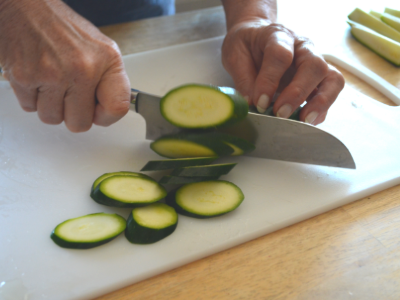
Slice into 1/4‐ to 1/2‐inch thick coins.
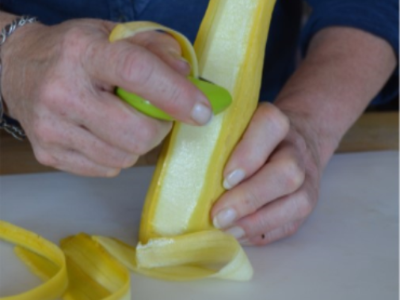
Peel the squash lengthwise to create thin strips.
Add to salads or baked dishes.
Grate the squash and use in baked goods.
Grow.
- Summer squash can be planted from seed or transplants. Seed germination occurs
when soil temperatures exceed 60oF with an ideal range of 65‐75oF at planting. Varieties
include chayote, patty pan, yellow crookneck, yellow straightneck and zucchini. Squash
prefer well‐drained soils with sufficient organic matter. Plant seeds ½‐1 inch deep in
mounds of soil approximately 48 inches apart or 12 inches apart in rows. If planning in
mounds, thin to 2‐3 plants per mound by pinching off plants at soil level when first true
leaves have formed. Consistently water squash through the season.
For more growing information, look for the MSU Extension MontGuide: Planting a Successful Home Vegetable Garden, or contact your local MSU Extension office.
Harvest.
- Summer squash only require 40‐60 days to mature, making them ideal for
Montana’s short growing season. Harvest fruit when they are immature with thin skins.
Picking before maturity encourages continual flowering of plants and additional fruit
production.
- Select small to medium size squash with tender, firm and glossy skin. Avoid squash
with signs of
decay, such as cuts, moldy spots, sunken areas or punctures. Avoid large squash which will have
harder seeds and dry texture. Large summer squash are often tough and bitter, but can be used in
recipes using shredded squash, such as zucchini bread. Squash between 4‐10 inches in size usually
have good flavor and are not fibrous or woody.
- Store in the crisper drawer in the refrigerator for up to one week. Do not store in a bag.
- Summer squash has a low nutrient value because it is picked when it is immature. Since
summer
squash consists of 95% water, it has few calories (about 20 per medium squash). This makes it a
great summer meal side dish. The vitamins and minerals is found in the skin, therefore, it is best to
not peel the squash before cooking.
Broil.
- Set broiler to high, with rack about six inches from heat. Cut squash in slices and
drizzle with olive oil and low‐sodium seasoning before
placing on a baking sheet. Cook 3‐5 minutes or until tender.
Grate.
- Add raw, grated squash to green salads, muffins or cookies. Use a vegetable peeler to make ribbons in place of pasta noodles.
Grill.
- Pierce cubed squash with a skewer and place over a preheated (medium‐high heat) grill.
Cook 5‐8 minutes or until tender. Pair squash with
tomatoes, onions, mushrooms, peppers or fruit.
Microwave..
- Place sliced squash in a microwave‐safe dish with 2‐3 tablespoons water. Cover and
microwave on high for 3‐4 minutes or until
tender.
Preserve.
- For more information on preserving vegetables, view these MSU Extension MontGuides: Freezing Vegetables. Or contact your local MSU Extension office.
Raw.
- Rinse and dry squash to enjoy sliced in salads or dipped in hummus or yogurt. For
raw salads, toss sliced or diced squash with vinaigrette,
place in refrigerator, allow to sit for at least four hours and serve cold.
Sauté.
- Heat pan to high, add butter or oil to coat bottom of pan and add sliced squash. Sauté
until lightly brown, about 3‐5 minutes, or until
tender. Remove from heat and use as side dish or add to vegetable dishes, lasagna, pasta and other dishes.
Season.
- To enhance flavor, experiment with low‐sodium seasonings such as allspice, basil,
cumin, curry powder, dill, oregano, rosemary, sage,
tarragon or thyme.
Steam.
- Place sliced or whole squash into steam basket. Steam 6‐10 minutes for sliced squash or 12‐15 minutes for whole squash.
For More Information:
Montana State University Extension: msuextension.org
MSU Extension Master Gardener: mtmastergardener.org
MSU Extension Food and Nutrition: nutrition.msuextension.org
MSU Extension Nutrition Education Programs: buyeatlivebetter.org
Date of Publication: November 2015
